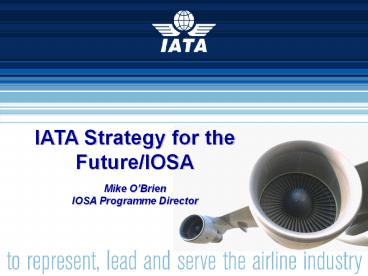IATA Strategy for the Future/IOSA - PowerPoint PPT Presentation
1 / 23
Title:
IATA Strategy for the Future/IOSA
Description:
Cathay Pacific. Transportes Aereos Portugueses S.A. PrivatAir SA. Findings. Observations. Not Applicable. Apr 2003. Dec 2003. Mar 2004. Jun 2004. ORG. FLT. DSP. MNT ... – PowerPoint PPT presentation
Number of Views:118
Avg rating:3.0/5.0
Title: IATA Strategy for the Future/IOSA
1
IATA Strategy for the Future/IOSA Mike
OBrien IOSA Programme Director
2
IATAs Commitment to Safety
- Safety is our industrys number one priority
The IATA Operational Safety Audit (IOSA) is at
the core of our efforts.. Standardisation is
critical to improving Safety. - - Giovanni Bisignani
- IATA CEO and Director General
3
Presentation Structure
- Accident rates and safety focus
- Safety Auditing IOSA
- Safety Data
- Ground Damage Prevention
- Cargo Safety
- Cabin Safety
- ATC Phraseology/Aviation English
- Fuel Tank Safety
4
Common Goal of Reducing the Accident Rate
5
Reduce Accident rate - particularly in the
Regions where these remain high
0.52
0.29
5.3
0.94
5.2
1.3
Hull losses per million departures by region of
operator, Western-built Jets 2004
World 0.78
6
IATA Six-point Safety Programme
7
What is IOSA?
- A standardized and structured airline safety
audit programme - Internationally recognized operational standards
- A model for operational safety/quality management
- A way to reduce the number of industry audits
- A model to improve global operational safety
8
Safety Auditing
IOSA
USOAP
States
Airlines
9
IOSA Progress
- 77 audits completed 36 more contracts signed
- 43 airlines on the Registry 50 audits avoided
- State support growing, exemplified by
Resolution at ICAO Assembly - IOSA is not designed to replace Regulatory
Oversight! - But it can most definitely complement it
10
IOSA Status
Audits
AuditRequests
11
Regional Audit Summary
As of 9 June 2005
12
IOSA Findings Conformity to Standards
13
Safety in Africa
- Almost 25 of accidents occurred in Africa.
- Main contributing factors
- Deficiencies in safety management.
- Poor training systems.
- Flight crew proficiency issues.
14
IATA Partnership for Safety
- Training
- Practical IOSA awareness seminars
- Gap Analysis
- Provide an assessment of the airline
- Implementation
- IATA members in developing regions
- Starting with AFI, then other regions.
- IATA financing plus matching funds
15
Safety Data Management Analysis
- Accidents Annual IATA Safety Report
- Lessons learned incorporated into future safety
initiatives.
- Incidents STEADES
- Quarterly reports highlight leading incident
issues. - Custom analysis of specific areas of concern.
- Normal Operations FDA Service
- Unique window into day to day operational
standards. - Specific occurrences can be analyzed and animated
for training purposes.
16
Ground Damage Prevention Programme
NO TYPE OR IMAGES CAN TOUCH THE SKY
- Why ?
4 B damage per year
17
- Ground Damage - Areas of Concern
- Cargo and Baggage Loading/Unloading
- Airbridge/Jetway Operations
- Ground Maintenance Operations
18
Ground Damage Prevention Programme Major
Deliverables
NO TYPE OR IMAGES CAN TOUCH THE SKY
- Conduct an awareness campaign on GDPP
- Obtain buy-in from concerned stakeholders
- Complete threat analysis
- Short term action plan to address weak areas
- Cost tracking tool - direct costs of ground
damage - Develop a SMS certification programme for service
providers - Establish harmonised incident/accident database
19
Cargo Safety
NO TYPE OR IMAGES CAN TOUCH THE SKY
- Cargo operations - 33 of the 2004 accidents
- Europe and North America negligible contributors
- Any accidents damage public confidence
- Involve States through ICAO
- Study higher threat areas, e.g wet lease
- Identify the best areas to focus action
- Develop IOSA for all-cargo operations
- Implement ASET recommendations on cargo
accident prevention
20
Cabin Safety
- Reduce turbulence-related cabin crew injury rate
by 50 by 2008 - Reduce inadvertent slide deployment rate by half
by 2008 - Cabin safety toolkit in development
- Includes training and incident analysis manual
- Include research conducted for future A380
operators - Toolkit ready Q3 2005
21
Aviation English Training and Testing
NO TYPE OR IMAGES CAN TOUCH THE SKY
- Language used in ATC comms has been a
contributory factor in many fatal accidents - New provisions for language proficiency and ATC
phraseology adopted by ICAO - Compliance date is March 2008
- To assist the industry, IATA has developed new
training and testing services.
22
Fuel Tank Safety
NO TYPE OR IMAGES CAN TOUCH THE SKY
- IATA fully agrees to the need for improvements in
the area of fuel tank safety - Various investigative analyses have confirmed the
effectiveness of alternate means of compliance - IATA therefore strongly supports a joint industry
effort to specify the final system modification
and inspection requirements, avoiding retrofits
for in-service aircraft
23
Conclusion - challenges
NO TYPE OR IMAGES CAN TOUCH THE SKY
- Seek greater Regulatory Authority buy-in to IOSA
- How can we better align Industry and State safety
programmes? - How can we streamline/coordinate these
programmes? - Its not a competition!
- Co-operation for safety improvement































